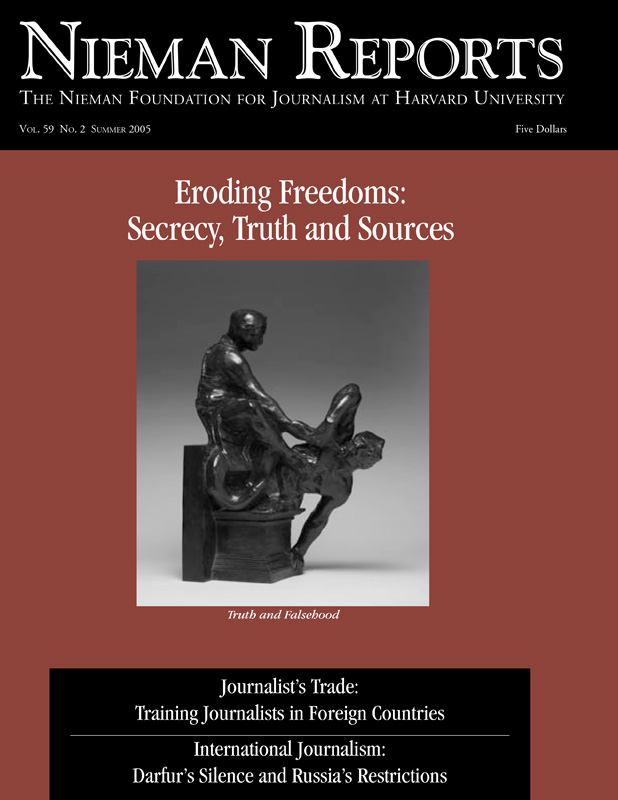In coverage of the court-marital trial of Army Sgt. Hasan Akbar, a soldier accused of killing other American soldiers with a grenade attack, officers at Fort Bragg required reporters to sign a restrictive agreement. For example, as a condition of gaining access to the court proceedings, Jeff Schogol, a reporter with the Express-Times of Easton, Pennsylvania, said he had to agree to 14 conditions. This situation, along with other related military-press situations, prompted the Military Reporters & Editors (MRE) association to send a letter to Defense Secretary Donald Rumsfeld to express concern and ask that similar constraints not be imposed on members of the press who cover military court proceedings. To see the Army’s response, go to www. militaryreporters.org. A copy of the MRE’s April 27th letter follows.
Dear Secretary Rumsfeld:
RELATED ARTICLE
“Truth and Trust: In Iraq War Coverage, They’ve Become Casualties”
– Sig ChristensonWe write on behalf of Military Reporters & Editors (MRE), a professional association of journalists that advances public understanding of the military, national security, and homeland defense; represents the interests of working journalists to the government and military, and assures that journalists have access to places where the U.S. military and its allies operate. The Society of Professional Journalists, the Military Reporters Protest Restrictions in Court Coverage Reporters Committee for Freedom of the Press, the Coalition of Journalists for Open Government, Associated Press Managing Editors, American Society of Newspaper Editors, and the Society of Environmental Journalists support this letter.
We have grave concerns about restrictions imposed in the Fort Bragg court martial of Army Sgt. Hasan Akbar. The most troublesome is an “agreement” that reporters were required to sign before gaining access to the proceedings, which includes a pledge to not interview soldiers at Fort Bragg about the case or ask legal advisors in the media room to speculate on the outcome. To ensure compliance with the agreement, reporters were escorted everywhere while on base, and some were monitored as they went to the restroom. The agreement and the Army’s actions under it are an affront to the First Amendment rights of free speech and press.
By this letter, we request that the Department of the Army rescind these constraints and assure that similar restrictions will not be imposed elsewhere. Press access to U.S. courts, including military courts, is protected constitutionally and is essential to public confidence in government. For these reasons, the Manual for Courts- Martial United States recognizes that openness of court-martial proceedings is the default rule.
We understand the right of access is not absolute. When presented with an appropriate compelling interest a judge can, upon notice to the public and an opportunity to be heard, order limited closure of a courtroom. This can be done only after finding no reasonable alternative will safeguard that interest and after providing for a narrow closure based on specific findings that can be reviewed on appeal.
The purported “agreement” does not meet that test. No public hearing was held, no showing was made, and no judicial findings were rendered to justify press restrictions of any sort. We therefore implore you to immediately renounce the constraints this document places on the press, so that we are not forced to bring this issue to a court’s attention.
We attach to this letter a story about the restrictions by Easton, Pennsylvania, Express-Times reporter Jeff Schogol. In the spirit born in the embedding of journalists with U.S. forces during Operations Enduring Freedom and Iraqi Freedom, we trust your review of Mr. Schogol’s story and this petition will lead your administration to work cooperatively with the press in resolving our concerns.
Sincerely,
Sig Christenson
President, MRE


